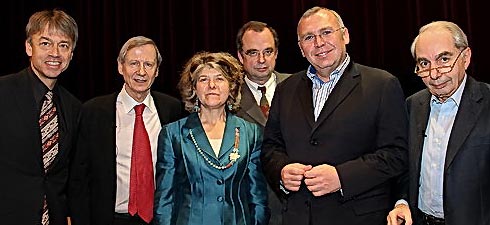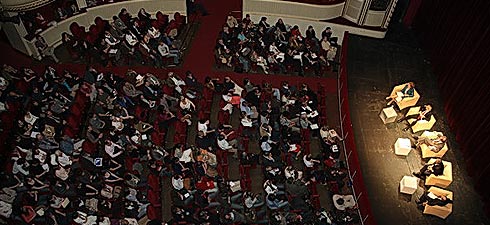At the sold-out event in Vienna’s Burgtheater, Sir Anthony Giddens began by asking jokingly how so many Viennese could show up for a panel discussion about "What holds a society together" when they might be enjoying a sunny Sunday morning and watching the city marathon. But an answer emerged as the event went on. The high-powered panel enjoyed a lively discussion of "social glue," with a great deal of audience involvement.
The final discussion in Vienna's "Let’s Talk about Europe" series included not only Sir Anthony, sociologist and former director of the famed London School of Economics, but also Austrian Chancellor Alfred Gusenbauer, former Italian Minister of the Interior Giuliano Amato, and Jennifer L. Hochschild, Professor of African and American Studies at Harvard.
What holds a society together?

The head of Allianz Cultural Foundation, Michael M. Thoss, with the panel participants Anthony Giddens, Jennifer L. Hochschild, moderator Krysztof Michalski, Alfred Gusenbauer and Giuliano Amato (from left); photos: Andreas Altmann
The challenges: Individualism and migration
Moderator Krysztof Michalski, Rector of the Institute for Human Sciences in Vienna, kicked off the debate with a question: "How can we create solidarity in a modern society with intense competition and people with varying identities?"
Giuliano Amato described two fundamental challenges that today’s societies face: first, more competition and the associated tendencies toward individualism, and second, the increase in migration in Europe. Both are loosening the traditional bonds of society. "We can strengthen cohesion only if we make it possible for individuals to really exercise their social rights," he said.
Integration: Rights and duties
"But rights also go hand in hand with duties, in order for a community to function," Giddens added. He also expressly urged people with a migrant background to take those duties seriously. This, he said, was the prerequisite for a cosmopolitan society, which was the right answer to economic globalization and communication without borders. He cited American sociologist Daniel Bell: "The nation state is too small to solve the big problems and too big to solve the small ones."
Chancellor Gusenbauer declared his express support for the combination of equal rights and duties, and added: "A well managed community works on three levels – the rule of law, social and economic cohesion, and cultural ties." He viewed language learning as the top priority in integrating immigrants. Only in this way can they participate socially, politically and economically, and avoid ghettos. It was high time, he said, to say farewell to naïve ideas of multiculturalism.

Vienna's Burgtheater was sold out for "Let's talk about Europe"
Affirmative action or equal treatment?
Jennifer Hochschild picked up this subject, comparing the American and French experiences with integration. In broad areas, she explained, the United States pursues a policy of affirmative action – "positive discrimination." This means, for example, that African-Americans get advantages and special assistance in entering universities. But at the same time, she said, the approach has revealed its limitations, since over time society has become less accepting of such programs. One success, in any case, was the formation of an African-American middle class. There have also been good results with redefining election districts so that ethnic minorities can elect their representatives.
On the other hand, the French policy of equal treatment – which goes so far that the state cannot even ask about a person’s ethnic background – failed to perceive problems for too long. Prof. Hochschild saw one possible solution in adopting a stakeholder approach: "We have to become more sensitive to the relevant groups. Shared basic convictions are the foundation. But we also have to realize that there are different perceptions of what discrimination is. Both of these are necessary for integration policies specific to their target groups."
The welfare state and religion
The panelists were unanimous about the importance of the welfare state to solidarity within a society. Chancellor Gusenbauer advocated the concept of an "activating" welfare state that sets a priority on enabling its citizens to take responsibility for themselves, rather than merely disbursing transfer payments. And in a globalized world, he said, the European Union has the particular role of protecting the European model of the welfare state.
There were differences about the current importance of religion for social cohesion. While Giddens and Gusenbauer felt ties seemed to be weakening, Amato was of the directly opposite opinion: "There are secular principles that can promote cohesion. But there’s no secular principle that tells us to ‘love our neighbors.’"
To be continued – in Berlin and elsewhere
Michael M. Thoss, the head of the Allianz Cultural Foundation, was very pleased with how the event went. "The great success of the ‘Let’s Talk about Europe’ series shows that people have a great need to hear European issues discussed in public. Our work at the Allianz Cultural Foundation helps fill that need, and contributes toward an active European civil society."
After four panel discussions in the "Let’s Talk about Europe" series in Vienna, and a total of eleven in Munich, the Allianz Cultural Foundation will continue the successful series in spring 2009 at Berlin’s Staatsoper. Single events in London, Stockholm and Venice are also planned for this coming fall.